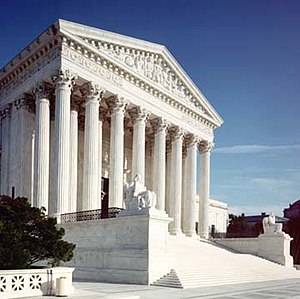 Image via Wikipedia
Image via WikipediaThe decision was not unanimous which means that these brilliant constitutional scholars do not see eye to eye on a very short amendment: “A well regulated militia, being necessary to the security of a free State, the right of the People to keep and bear arms, shall not be infringed” (1787).
Note: I am not against people owning guns although I think we need strict(er) rules as to who may purchase one and rules mandating proper training as to use and storage of said guns.
My concern here is the interpretation of the Constitution and how these judges can openly and unabashedly interpret the Constitution in a way so as to conform to their belief system or ideology.
As I have stated on many blog occasions, one has to look at what the writers of the 2nd Amendment actually meant in 1787 in using the words that they did.
It is very clear that they were talking about a “well regulated militia” that each state had and which was composed of individuals (with guns) that could be called on in an emergency. In those days, a state militia was vitally important since the federal government was not strong enough or near enough to protect each state. I have over-simplified this explanation but go into much more detail in past blogs (search: 2nd Amendment).
In 1903, Congress passed the Militia Act which did away with the old state militia and established a “National Guard” for each state.
In a nut shell, since we no longer have state militias, the 2nd Amendment is a dead amendment because it pertains to something that does not exist anymore; state militias. In this case, the right to bear arms is no longer a federal issue since it is a constitutionally moot point, and must become a matter for each state to decide.
 So why are the conservatives on the Supreme Court incorrectly interpreting the 2nd Amendment and keeping the power to decide on gun issues to themselves? That is an interesting and very troubling question since the Supreme Court is the final and absolute interpreter of what is or isn’t constitutional and therefore legal or illegal.
So why are the conservatives on the Supreme Court incorrectly interpreting the 2nd Amendment and keeping the power to decide on gun issues to themselves? That is an interesting and very troubling question since the Supreme Court is the final and absolute interpreter of what is or isn’t constitutional and therefore legal or illegal.



No comments:
Post a Comment